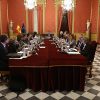
Journalism is said to be the first rough draft of history. When Financial Times (FT) journalist Tobias Buck took up his post in Madrid at the end of 2012, Spain was in the throes of crises on three fronts that were superimposed on one another like Russian nesting dolls: economic; a lack of legitimacy emanating from a discredited political class and its endemic corruption; and institutional, with a major loss of confidence and profound lack of trust in state institutions as a result of their colonisation by politicians. As the correspondent for one of the world’s most comprehensive newspaper (the other is The Economist) and one that opens doors to speak with the powers that be, he was ideally placed to witness history in the making.
By the time he left Madrid in 2017, Spain was back on its feet, at least economically. The pre-crisis (2008) GDP level had been regained, the unemployment rate had peaked at 27% (there were 6 million jobless when he arrived) and the fiscal deficit was coming down from a whopping 11% of GDP. Public debt, however, had ballooned to 100% of GDP and the number of banks had been whittled down from 55 to 10. Politically the country had become fragmented and the Catalan movement for independence was in full swing, culminating in an illegal referendum and a fleeting unilateral declaration of independence. The general election in December 2015 significantly changed the mould of politics, forged during the 1975-78 transition to democracy. Two upstart parties, the at that time centrist Ciudadanos (‘Citizens’ or Cs) and the anti-austerity Podemos (‘We Can’), broke the hegemony of the conservative Popular Party (PP) and the centre-left Socialists (PSOE), the two mainstream parties.
Buck’s After the Fall: Crisis, Recovery and the Making of a New Spain (W&N) is a vibrant and affectionate portrait of a country that got under his skin. Shortly before leaving, the author endeared himself to Spaniards, who can often be prickly about what foreigners write about their country, when he wrote a paean to his four years in Spain, part of which is woven into the book’s prologue. What impressed him was the resilience, energy and tolerance of Spanish society.
Rather than setting out to develop a thesis and offer solutions to the problems, the book draws extensively on Buck’s even-handed and intrepid reporting in the FT to show how Spain got where it did and how it is changing. He travelled the length and breadth of the country. There are chapters on Catalonia (the region is ‘slowly, erratically moving toward a tipping point’), on Valencia (ground zero of the massive property bubble, corruption and waste), on the impact of the crisis on young adults, many of whom left school at 16 to work in the construction sector (the early school-leaving rate reached more than 30%) and were the first to lose their jobs, on the rise of the far-left Podemos and the far-right VOX (embryonic while he was in Spain), on the ascendance of Mariano Rajoy from head of an obscure provincial government to the highest office as Prime Minister, on the terrible problem of bringing to an end the violence of the Basque terrorist group ETA (it disbanded after Buck left Spain), on what to do with the mausoleum of General Franco and the process of coming to terms with the 1936-39 Civil War and the dictatorship, and on the millions of ‘new’ Spaniards (immigrants, with the focus on the Chinese, a little written-about community).
Buck speaks with Rajoy, Pablo Casado, Rajoy’s successor as head of the PP, the Socialist leader Pedro Sánchez, Pablo Iglesias, the leader of Podemos, Albert Rivera, the leader of Cs, Carles Puigdemont, the former Premier of Catalonia, and Manuela Carmena, the leftist Mayor of Madrid, to name just a few of the leading politicians. Many of the most interesting people he met were ordinary citizens hit by the crisis and the stories they told him.
One person who surprisingly hardly figures in the book is José Luis Rodríguez Zapatero, the former Socialist Prime Minister, on whose watch the crisis happened, albeit before Buck’s arrival, and who bears a large part of the responsibility for the failed economic policies. Almost all the mentions of him are to do with measures to come to terms with the Francoist past.
It is shocking, even for those who like myself have lived far longer in Spain than Buck, to be reminded of the appalling waste of public money and greed of some of the politicians particularly during the PP’s long rule in the region of Valencia, its former fiefdom. The chapter largely based on Valencia is a depressing read: the City of Arts and Science ended up costing four times the expected outlay (€300 million) and the Formula One racetrack was abandoned after just five races, to name two of the failed vanity projects. The most outrageous scandal, though not in monetary terms, was that of Rafael Blasco, who began his political life as a communist, then joined the Socialists and ended up in a senior position for the PP as regional Minister for Co-operation and Development, where he syphoned off almost €1.8 million in funds earmarked for social projects in impoverished Nicaragua. At least, justice caught up with him and he was sentenced to six years in prison.
Buck has a nice turn of phrase: a decade after the end of the construction fiesta ‘modern ruins and half-ruins are scattered across the nation’s cities like confetti after the parade’. The aloof Rajoy ‘shared the common passion (football: his favourite newspaper is said to be As, one of the leading sports dailies), but lacked the common touch’.
As for Franco’s grandiose mausoleum, Buck believes the time has come to ‘shift perceptions as well as tombstones’ and to ‘build a new memorial to the victims’, but a national consensus remains elusive.
Despite the depth and length of the crisis and the problems that remain, Buck is optimistic. He takes heart from the sociability of Spaniards and the extent to which social life takes place outdoors. The square in Madrid near his flat ‘probably offered migrants and locals more opportunities to meet in one night than they would have had in a normal German, Dutch or English city in a whole year’.
But, like many observers, he laments the pathetic failure of Spain’s entrenched political leaders to forge a coalition. Almost three months after April’s general election, Spain still does not have a government. ‘Being the biggest bloc in parliament is of limited use when that bloc holds only a little more than a third of the seats in the legislature,’ says Buck. ‘A party that cannot strike deals across the aisle, in other words, will have little hope of ever leading the Spanish government. It may take time for that conclusion truly to sink in, but it is hard to imagine a stronger incentive for Spain’s new breed of political leaders to change their stance’. Amen to that.
Spain’s politicians should follow the example of the country where Buck is now a correspondent: Germany, where coalition governments have been the norm for decades. Spain, together with Malta, is still the only EU country that has not had a national coalition government in the last 40 years. This has to change.


